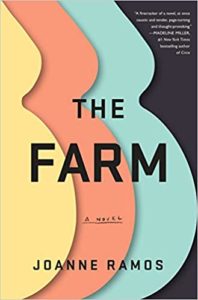I’ve decided to start reviewing more books on this blog. All of the rest of the titles I’ve set aside for this purpose for the foreseeable future are indie, but I thought I’d start off with something mainstream. The star rating below is out of a possible five stars.
 Title: The Farm
Title: The Farm
Author: Joanne Ramos
Publisher: Doubleday Canada
Publication Date: May 7, 2019
Genres: Dystopian, Contemporary, and a pinch of Science Fiction
Page Count: 326 pages
Source: I borrowed it from my local library
Rating: 3 Stars
Blurb:
Nestled in New York’s Hudson Valley is a luxury retreat boasting every amenity: organic meals, personal fitness trainers, daily massages—and all of it for free. In fact, you’re paid big money to stay here—more than you’ve ever dreamed of. The catch? For nine months, you cannot leave the grounds, your movements are monitored, and you are cut off from your former life while you dedicate yourself to the task of producing the perfect baby. For someone else.
Jane, an immigrant from the Philippines, is in desperate search of a better future when she commits to being a “Host” at Golden Oaks—or the Farm, as residents call it. But now pregnant, fragile, consumed with worry for her family, Jane is determined to reconnect with her life outside. Yet she cannot leave the Farm or she will lose the life-changing fee she’ll receive on the delivery of her child.
Gripping, provocative, heartbreaking, The Farm pushes to the extremes our thinking on motherhood, money, and merit and raises crucial questions about the trade-offs women will make to fortify their futures and the futures of those they love.
Review:
The first time I heard of The Farm was a few months ago when another reviewer compared it to Margaret Atwood’s The Handmaid’s Tale, one of my all-time favourite books. As soon as I read that line, I was hooked. Like Ms. Atwood’s famous story, this one is also about fertile, generally lower-class women being used to gestate babies for the most powerful members of society.
Unlike the characters in The Handmaid’s Tale, Jane and the other surrogates chose to become impregnated. Whether they knew what they were really consenting to is something I can’t discuss much in this review without wandering into spoiler territory. Let’s just say that the glossy description of what this job was like didn’t necessarily match Jane’s actual experiences with it.
What I would have loved to see from this book were more details. The most frightening parts of it were glossed over so much that I had to make educated guesses about how they played out. While Jane’s perspective was a limited one, it was a little frustrating as a reader to get so far into the plot only to receive the same vague hints that were contained in the blurb and early chapters.
There was a satisfying payoff for a subplot involving the woman who first introduced Jane to the idea of gestating a pregnancy at The Farm. If only the other clues at the beginning were given the same treatment. Not every dystopia is necessarily going to include a government being overthrown or other major signs that a society has gone terribly wrong. I loved the more subtle approach Ms. Ramos took with the assumptions she made about how people might respond if they couldn’t find decent paying work and selling the use of their reproductive organs seemed like the best option to make some semi-quick cash. If only she’d developed these thoughts further.
With that being said, one of the things I liked the most about this storywas how realistic it was. Yes, there were little snippets of what could be interpreted as science fiction and dystopian content in it, but everything in it is either really happening in our world today or could easily occur with a few small tweaks to how science works and what society tolerates. This is the kind of soft science fiction that grabs my attention because of how close it is to our reality.
I can sleep easily at night knowing that little green men from Mars aren’t actually ever going to invade Earth. The thought that women could so easily be coerced or enslaved into producing babies for wealthy, powerful families, on the other hand, is chilling because it has happened in the past, it is currently going on in some parts of the world, and it will almost certainly occur again in the future.
That’s frightening. Despite it’s flaws, The Farm’s no-nonsense approach to this topic is why I’ll recommend it to anyone who finds the blurb interesting.
